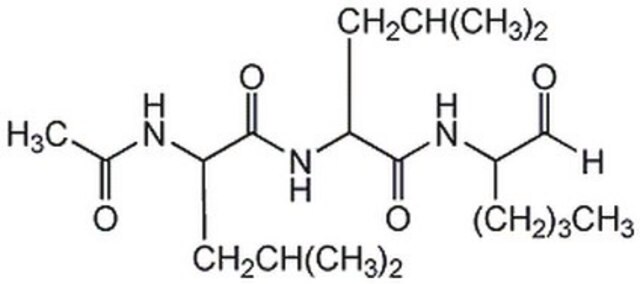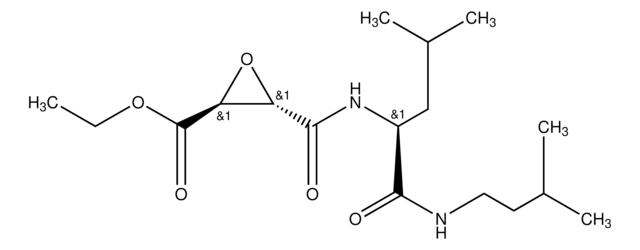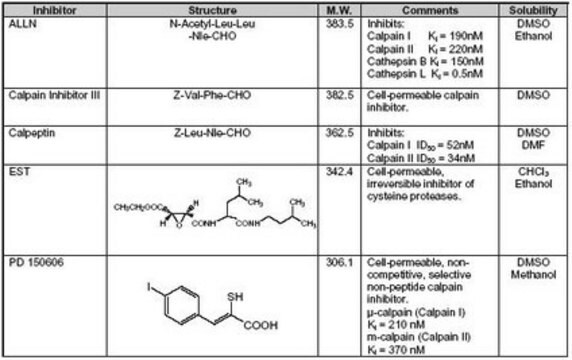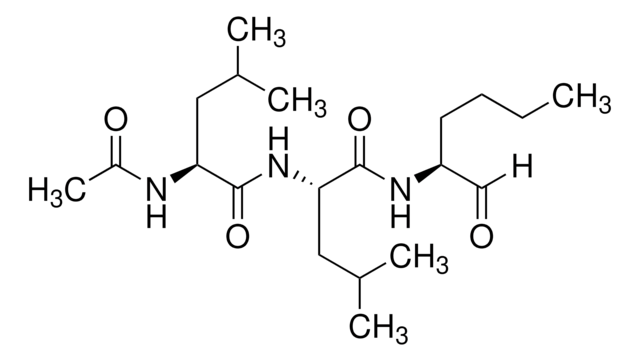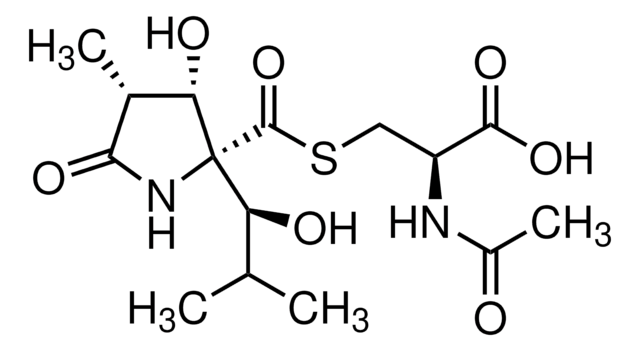208750
ALLN
InSolution, ≥95%, Inhibitor of calpain I, calpain II, cathepsin B, and cathepsin L
Synonym(s):
InSolution ALLN, Calpain Inhibitor I, LLNL, MG 101, Proteasome Inhibitor V
About This Item
Recommended Products
Quality Level
Assay
≥95% (HPLC)
form
solution
manufacturer/tradename
Calbiochem®
storage condition
OK to freeze
protect from light
color
clear colorless
shipped in
wet ice
storage temp.
−20°C
SMILES string
N([C@@H](CC(C)C)C(=O)N[C@@H](CCCC)C=O)C(=O)[C@@H](NC(=O)C)CC(C)C
InChI
1S/C20H37N3O4/c1-7-8-9-16(12-24)22-19(26)18(11-14(4)5)23-20(27)17(10-13(2)3)21-15(6)25/h12-14,16-18H,7-11H2,1-6H3,(H,21,25)(H,22,26)(H,23,27)/t16-,17-,18-/m0/s1
InChI key
FMYKJLXRRQTBOR-BZSNNMDCSA-N
General description
Biochem/physiol Actions
calpain 1
Packaging
Warning
Physical form
Reconstitution
Other Notes
Griscavage, J.M., et al. 1995. Biochem. Biophys. Res. Commun.215, 721.
Squier, M.K., et al. 1994. J. Cell Physiol.159, 229.
Rami, J., and Kreiglstein, J. 1993. Brain Res.609, 67.
Legal Information
Storage Class Code
10 - Combustible liquids
WGK
WGK 2
Flash Point(F)
188.6 °F - closed cup
Flash Point(C)
87 °C - closed cup
Regulatory Listings
Regulatory Listings are mainly provided for chemical products. Only limited information can be provided here for non-chemical products. No entry means none of the components are listed. It is the user’s obligation to ensure the safe and legal use of the product.
FSL
Group 4: Flammable liquids
Type 3 petroleums
Hazardous rank III
Water insoluble liquid
ISHL Indicated Name
Substances Subject to be Indicated Names
ISHL Notified Names
Substances Subject to be Notified Names
JAN Code
208750-5MG:
Certificates of Analysis (COA)
Search for Certificates of Analysis (COA) by entering the products Lot/Batch Number. Lot and Batch Numbers can be found on a product’s label following the words ‘Lot’ or ‘Batch’.
Already Own This Product?
Find documentation for the products that you have recently purchased in the Document Library.
Our team of scientists has experience in all areas of research including Life Science, Material Science, Chemical Synthesis, Chromatography, Analytical and many others.
Contact Technical Service